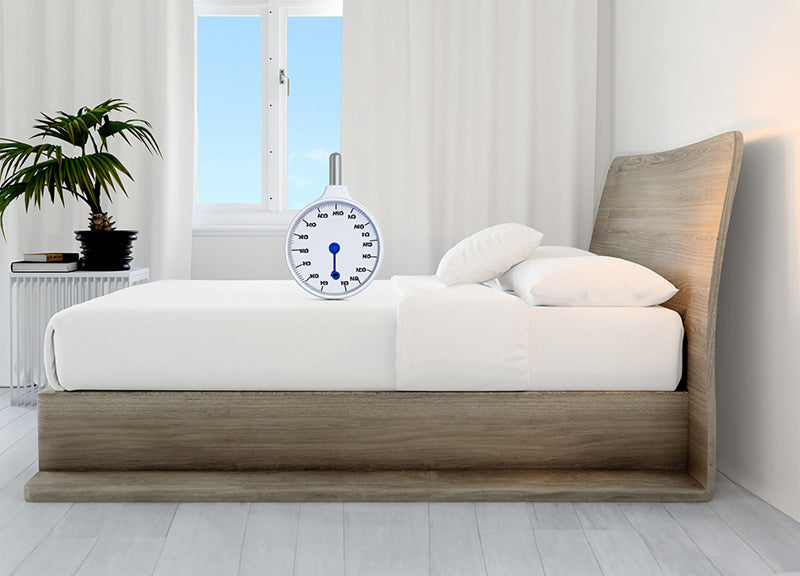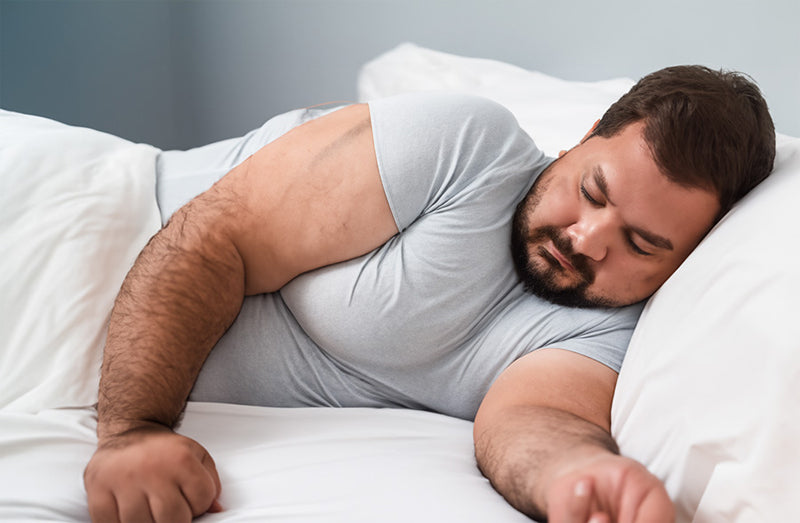No Products in the Cart
Zulekha Nishad is a content specialist with a Master’s in English Language and Literature. She specializes in sleep health, eco-friendliness, mattresses, bedding, and sustainable living, supported by years of deep research. Read more
Last Updated September 3, 2025
Have you ever wondered about the profound impact that the firmness of a mattress can have on both the quality of your sleep and the health of your spine? A study published in 2022 highlighted the pivotal role that mattress firmness plays in influencing the alignment of your spine, ultimately affecting your comfort and sleep quality. Notably, the degree of firmness or plushness your mattress offers is intricately linked to the comfort you experience while sleeping.
While it's true that several other factors contribute to a mattress's overall comfort, in this article we'll take a detailed look into the mattress firmness scale (including the firmness level, feel, and features), how they affect sleep quality, and which ones are most suitable for certain sleeping positions.

Key Takeaways:
When we talk about mattress firmness, we're simply referring to how hard or soft a mattress feels when you sleep on it. It's an essential factor that can significantly impact the quality of your sleep by helping you maintain proper spinal alignment and ensuring you're comfortable and relaxed, leading to better sleep.
Mattress manufacturers design their products with specific firmness levels in mind. However, it's important to note that the experience of firmness can be subjective. Two people sleeping on the same mattress might feel it differently - Factors such as your body weight, sleep position, and health conditions all influence what is comfortable and supportive for you. For instance, a lighter person may find a mattress to be firmer, while a heavier individual might think it's softer.
Generally, the firmness of a mattress is rated on a scale from 1 to 10, with 1 being the softest and 10 being the firmest. The primary factor affecting firmness is the materials used in making the mattress. The comfort layer, often made from materials like memory foam or latex, is what makes a mattress feel soft or firm. The presence of a transition layer can also affect how firm the mattress seems, while the support core keeps the mattress structurally sound.
| FIRMNESS LEVEL | FEEL | FEATURES |
|---|---|---|
| 1 | Extra Soft |
|
| 2-3 | Soft |
|
| 4 | Medium Soft |
|
| 5 | Medium |
|
| 6 | Medium Firm |
|
| 7-8 | Firm |
|
| 9-10 | Extra Firm |
|
Below, let's break down the mattress firmness scale in detail:
If a mattress is rated between 1 and 3 on the firmness scale, it's very soft and might also be called plush. Here's what you need to know about these types of mattresses:
Support: Very soft mattresses are comfy for lightweight side sleepers (under 130 pounds). But if you're heavier or prefer other sleeping positions, you might sink in too much, which isn't great for your back.
Conforming properties: Soft mattresses hug your body closely, relieving pressure and making you feel like you're being cradled. Some people with pressure points love this, but it can feel a bit too snug for others.
Durability and resilience: Softer mattresses often wear out faster because they're made with plush materials.
Popularity: Extra soft mattresses are less common, so you might have trouble finding them. Soft options are easier to come by.
Cost: Soft and extra-soft mattresses tend to cost more due to their thick comfort layers that cradle your body.
Mattresses rated between 4 and 6 on the firmness scale are in the middle range that most people like. Here's what you should know about them:
Support: These mattresses offer moderate support and less sinkage compared to softer ones. People weighing between 130 and 230 pounds usually find a good balance of contouring and support.
Conforming properties: Medium soft to medium firm mattresses often have a comfy design that relieves pressure points.
Durability and resilience: These mattresses typically last longer than softer ones because they're made with sturdier materials.
Popularity: These mattresses are very popular, and you can find them from many manufacturers.
Cost: They're usually less expensive because they have a simpler comfort system, and their popularity keeps the prices competitive.
Mattresses rated between 7 and 10 are quite firm and sturdy. Here's what you need to know about them:
Support: Firm to extra firm mattresses are excellent for heavier sleepers (over 230 pounds) and stomach sleepers who want to maintain good spinal alignment.
Conforming properties: These mattresses have thinner comfort layers and don't hug your body closely. Some side sleepers might feel pressure around their hips and shoulders.
Durability and resilience: These mattresses are made with durable materials, so they often last longer than softer options.
Popularity: Firm mattresses are quite popular and available from many retailers, but extra firm ones might be a bit harder to find.
Cost: They're usually less expensive because they don't use extra padding materials, making them more budget-friendly.

Many people assume that a firmer mattress automatically provides better support, as firmer mattresses often feel more supportive. However, it's important to understand that these two terms are not the same.
When we talk about mattress firmness, we're referring to how the top layers of the mattress feel when you first lie down. On the other hand, mattress support relates to the base and core layers, which have a more significant impact on spinal alignment and pressure relief. In simpler terms, the foundation and core layers are responsible for keeping your body aligned and reducing pressure points, while the upper layers affect how the mattress feels.
For an ideal sleep experience, you need a mattress that offers both firmness and support. Balancing these factors ensures a restful night's sleep.

But how can you determine the best mattress that has a good balance of both firmness and support? Let's explore a few key considerations to keep in mind when making your decision.
We all sleep in different ways, and this can impact what feels comfortable to us. Depending on how you sleep (on your back, side, or stomach), some firmness levels may be better for you.

If you prefer sleeping on your side, look for a softer mattress. The extra soft to medium-soft range will provide the necessary cushioning for your shoulders and hips, preventing uncomfortable pressure points.
If you're someone who falls asleep on your back, a medium to medium firm mattress is your ideal choice. This firmness level helps maintain the natural alignment of your spine, ensuring proper support for your back without allowing it to sink too deeply into the mattress.
If you snooze on your stomach, choose a firmer mattress to prevent your midsection from sinking too much. This keeps your spine in a more neutral position.
For those who switch positions throughout the night, aim for middle-ground firmness. This way, your mattress accommodates various sleeping postures.
Your body weight also affects the level of support and comfort you need from your mattress.

Choose a softer mattress to ensure proper contouring and comfort. Extra soft to medium-soft mattresses offer a gentle cradle for your body.
The medium firmness range is the sweet spot for those within this weight range. It strikes a balance between support and comfort, preventing you from sinking too deeply into the mattress.
If you fall into this category, a firmer mattress is your best bet. It offers the necessary support to prevent you from bottoming out.
Consider any specific health conditions or discomfort you may have when selecting your mattress firmness.

If you're dealing with hip pain, select a medium-soft to medium mattress. These firmness levels offer sufficient cushioning without compromising support, helping to alleviate pressure on your hips.
To address shoulder pain, go for a softer mattress that provides gentle cushioning around the shoulders. This will help prevent discomfort and pain during the night.
If you're experiencing neck pain, a medium to medium firm mattress is the best choice. It keeps your neck in line with your spine, ensuring proper support and potentially alleviating discomfort.
Individuals with back pain often find relief with a medium-firm to firm mattress. These firmness levels offer the support necessary to maintain a healthy spinal alignment and help alleviate back pain.
In addition to the factors mentioned above, there are several other factors to keep in mind:
Consider the durability of the mattress. Higher-quality materials and construction often result in a longer-lasting mattress, which can be a wise investment in the long run.
If you share your bed with a partner, it's essential to discuss and agree on the right firmness level. Some mattresses offer dual firmness options, allowing both partners to customize the side of the bed to their preference.
Your budget is a crucial factor. It's important to balance your budget with the quality and features you desire in a mattress. Remember that a mattress is a long-term investment in your sleep quality and overall health.
The type of mattress you select can have a significant impact on the overall comfort and firmness of your sleeping surface. There are four common types of mattresses, each characterized by the materials used in their construction: innerspring, memory foam, latex, and hybrid mattresses. Understanding the key attributes of each types can help you make an informed decision.

Latex mattresses utilize a responsive material that distributes the sleeper's body weight over a wider area, which relieves pressure and limits sinkage. The firmness of latex mattresses can vary significantly between models.
Typically, Talalay latex is softer than Dunlop latex, and the specific firmness level depends on the manufacturing process and the blend of latex used.
Memory foam mattresses are composed of polyurethane with added chemicals that increase it's viscosity. They conform closely to the body and provide excellent pressure relief.
Memory foam models are often softer than other mattress types, although there are exceptionally firm options available. The firmness of foam mattresses can be influenced by the type and density of foam used in their construction.
Hybrid mattresses combine the coil support core of the innerspring with thicker comfort layers of foam or latex. These mattresses offer a balance between support and contouring to relieve pressure.
The firmness of hybrid mattresses varies widely, making it easier for shoppers to find a model in their preferred firmness range.
Innerspring mattresses rely on a coil support core, typically made of steel. The firmness of innerspring mattresses can vary due to factors such as the coil pattern and gauge.
However, in general, innerspring mattresses are known for being bouncy, breathable, and supportive. They often have a firmer feel because they typically don't have thick comfort layers.

Adjustable mattresses are designed with customizable firmness settings, allowing sleepers to tailor the mattress to their comfort preferences. These mattresses often come with remote controls or smartphone apps that enable users to make real-time adjustments to the firmness level, making them suitable for those who desire a personalized sleeping experience.
Flippable mattresses are crafted with different firmness levels on each side, enabling sleepers to flip the mattress to switch between soft and firm surfaces. This dual-sided design extends the lifespan of the mattress and caters to those who seek flexibility in their sleep comfort without being locked into a single firmness level.
To determine if your mattress is the right firmness for you, pay close attention to how it feels when you lie down. It's all about finding that sweet spot where you're both comfortable and well-supported. Here are some key indicators:

If you sink too deeply into the mattress, especially in the hip and shoulder areas, it might be too soft. This can lead to improper spinal alignment and pressure points.
Waking up with aches, pains, or stiffness in your back, neck, or joints is a sign of inadequate support.

If you feel like you're lying on a rock with no cushioning, the mattress is likely too hard. You may experience discomfort and restless nights.
Similar to a plush mattress, waking up with discomfort is a sign that your mattress isn't providing the necessary comfort and support.
An understanding of the mattress firmness scale can help you choose the right bed that won't leave you tossing and turning all night. Research is the key - determine what level on the mattress firmness scale works best for you, factoring in your body type, preferred sleeping position, and overall comfort.
Whether it's extra soft or ultra-firm, there are mattress options out there to suit individuals with a variety of needs. Don't stop there – ask questions when you shop and test out beds in person before deciding which one is right for you. Also, remember that testing out different mattresses in person is invaluable. Lying down on a mattress and experiencing its feel firsthand is often the best way to determine if it's the right fit for you.
With an informed decision that fits your budget, comfort, and lifestyle, achieving restful nights will be easier than ever!
For back and stomach sleepers, a medium to firm mattress tends to be the best choice. This level of firmness provides the necessary support for maintaining proper spinal alignment and preventing discomfort. However, personal comfort preferences can vary, so it's essential to try out different mattresses to find the one that feels just right for you.
For side sleepers, a soft to medium-firm mattress is typically the most comfortable choice. This level of firmness can help relieve pressure on your shoulders and hips, allowing for a more restful and pain-free night's sleep.
Indeed, a medium-firm mattress is often a wise option for individuals dealing with back pain. This particular mattress type strikes a balance between being neither too hard nor too soft, which can be beneficial in addressing back discomfort.
A harder mattress can provide more support, which may be suitable for back or stomach sleepers. Softer mattresses offer more cushioning, often preferred by side sleepers. The key is finding the right balance for your comfort and support needs.
The best firmness for a mattress varies from person to person. It's about finding what feels most comfortable and supportive to you.
Factors like your sleep position, body weight, and personal preferences come into play. Soft, medium, and firm mattresses all have their place.
Experimenting with different firmness levels and considering your specific needs are the best ways to determine the right choice for you.
Most hotel beds use medium-firm mattresses. This choice aims to cater to a wide range of guests with different preferences. The goal is to create a comfortable and neutral sleep environment that can accommodate most people, whether they prefer a softer or firmer feel.
Yes, mattresses can get softer as they age. The softening process depends on factors like mattress materials, body weight, and frequency of use.
Memory foam and polyurethane foam mattresses tend to soften faster, especially for heavier individuals.
If your mattress becomes too soft and affects sleep quality, it might be time to consider a replacement, as mattress quality and usage frequency play a significant role in its durability.
Related blog posts:
4. How to Sleep on Your Stomach
5. How To Sleep With Back Pain?
Disclaimer: What is said in this article has been referenced from multiple sources and is intended only for educational and informational purposes. Please note that no content in this article is a substitute for professional advice from a qualified doctor or healthcare provider. Always consult an experienced doctor with any concerns you may have regarding a health condition or treatment, and never disregard any medical suggestions or delay in seeking treatment because of something you read here.
Notify me when available
We will send you a notification as soon as this product is available again.
We don't share your email with anybody


